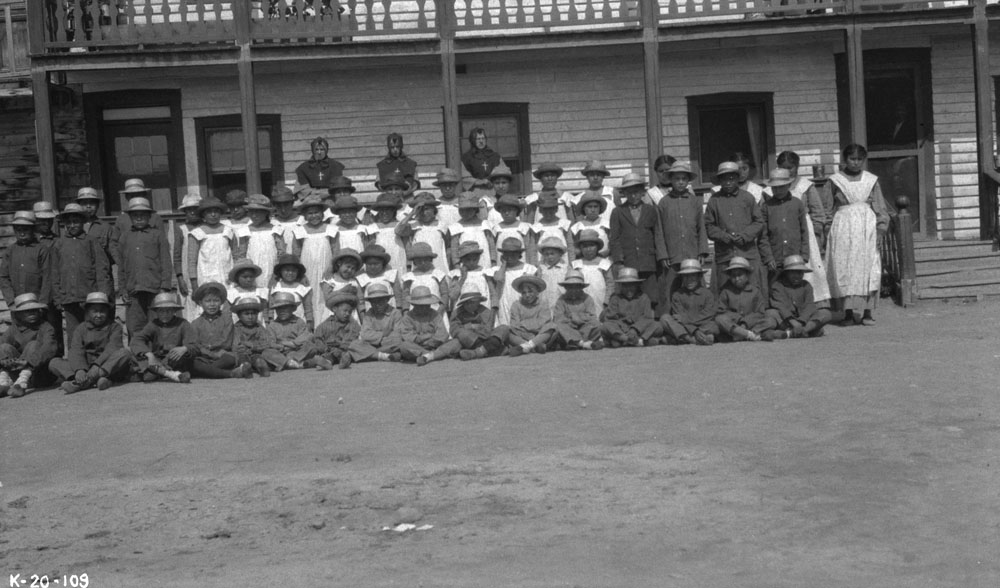Canada’s policy of forcibly separating aboriginal children from their families and sending them to residential schools amounted to “cultural genocide,” a six-year investigation into the now-defunct system found on Tuesday.
 The residential school system attempted to eradicate the aboriginal culture and to assimilate aboriginal children into mainstream Canada, said the long-awaited report by the Truth and Reconciliation Commission of Canada.
The residential school system attempted to eradicate the aboriginal culture and to assimilate aboriginal children into mainstream Canada, said the long-awaited report by the Truth and Reconciliation Commission of Canada.
The commission was launched as part of a settlement with survivors.
Prime Minister Stephen Harper apologized to the survivors of the schools in 2008.
In prepared remarks unveiling the report, Justice Murray Sinclair, who headed the panel, acknowledged “that what took place in residential schools amounts to nothing short of cultural genocide — a systematic and concerted attempt to extinguish the spirit of Aboriginal peoples.”
The report documented horrific physical abuse, rape, malnutrition, and other atrocities suffered by many of the 150,000 children who attended the schools, typically run by Christian churches on behalf of Ottawa from the 1840s to the 1990s.
“They were torn from their parents, who often surrendered them only under threat of prosecution,” said the commission.
“Then, they were hurled into a strange and frightening place, one in which their parents and culture would be demeaned and oppressed.”
Children as young as five years old were removed from their families and ancestral lands and sent to schools far away.
Regarded as heathens and savages by the system’s architects, they were beaten for speaking their native language and often forced to accept the Christian faith.
The legacy of the residential school system persists as many Canadian aboriginals, including Indians, Inuit, and Métis, struggle to recover from generations of family separation and state-backed abuse. Aboriginal people make up about four per cent of Canada’s population, according to 2011 census data.
Canada’s 1.4 million aboriginals have higher levels of poverty and a lower life expectancy than other Canadians, and are more often victims of violent crime, addiction, and incarceration.
Aboriginal children make up nearly half of all Canadian children aged 14 and under who live in foster care, according to Statistics Canada.
The panel’s 370-page summary of the final report identified more than 45 convictions of former residential school staff members who sexually or physically abused students, and condemned government and church leaders for working to hide the truth.
“It was cowardly behaviour,” said the commission.
The group made 94 reconciliatory recommendations, including special human rights and anti-racism training for public servants, and for the history of aboriginal people and legacy of residential schools to be taught in Canadian schools.
It also urged the Pope to apologize to survivors and their families for the Catholic Church’s role in the schools, as the church had done in 2010 for Irish victims of abuse.
Read the TRC’s 388-page executive summary of its work here.
 The residential school system attempted to eradicate the aboriginal culture and to assimilate aboriginal children into mainstream Canada, said the long-awaited report by the Truth and Reconciliation Commission of Canada.
The residential school system attempted to eradicate the aboriginal culture and to assimilate aboriginal children into mainstream Canada, said the long-awaited report by the Truth and Reconciliation Commission of Canada.The commission was launched as part of a settlement with survivors.
Prime Minister Stephen Harper apologized to the survivors of the schools in 2008.
In prepared remarks unveiling the report, Justice Murray Sinclair, who headed the panel, acknowledged “that what took place in residential schools amounts to nothing short of cultural genocide — a systematic and concerted attempt to extinguish the spirit of Aboriginal peoples.”
The report documented horrific physical abuse, rape, malnutrition, and other atrocities suffered by many of the 150,000 children who attended the schools, typically run by Christian churches on behalf of Ottawa from the 1840s to the 1990s.
“They were torn from their parents, who often surrendered them only under threat of prosecution,” said the commission.
“Then, they were hurled into a strange and frightening place, one in which their parents and culture would be demeaned and oppressed.”
Children as young as five years old were removed from their families and ancestral lands and sent to schools far away.
Regarded as heathens and savages by the system’s architects, they were beaten for speaking their native language and often forced to accept the Christian faith.
The legacy of the residential school system persists as many Canadian aboriginals, including Indians, Inuit, and Métis, struggle to recover from generations of family separation and state-backed abuse. Aboriginal people make up about four per cent of Canada’s population, according to 2011 census data.
Canada’s 1.4 million aboriginals have higher levels of poverty and a lower life expectancy than other Canadians, and are more often victims of violent crime, addiction, and incarceration.
Aboriginal children make up nearly half of all Canadian children aged 14 and under who live in foster care, according to Statistics Canada.
The panel’s 370-page summary of the final report identified more than 45 convictions of former residential school staff members who sexually or physically abused students, and condemned government and church leaders for working to hide the truth.
“It was cowardly behaviour,” said the commission.
The group made 94 reconciliatory recommendations, including special human rights and anti-racism training for public servants, and for the history of aboriginal people and legacy of residential schools to be taught in Canadian schools.
It also urged the Pope to apologize to survivors and their families for the Catholic Church’s role in the schools, as the church had done in 2010 for Irish victims of abuse.
Read the TRC’s 388-page executive summary of its work here.







